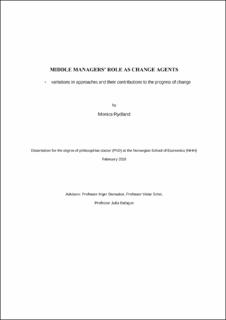Middle managers’ role as change agents - Variations in approaches and their contributions to the progress of change
Doctoral thesis
Permanent lenke
https://hdl.handle.net/11250/2641168Utgivelsesdato
2018-06Metadata
Vis full innførselSamlinger
Sammendrag
The purpose of this thesis is to explore the various ways in which middle managers approach their role as change agents. Existing research on organizational change has primarily emphasized the implementation of change as middle management’s main role during strategic change. I argue that middle managers are facing increasing challenges and expectations and particularly an increased pace of change. I therefore anticipate that the middle manager's role in strategic change may be more diverse than has been suggested in the previous literature. In order to examine how middle managers at various levels approach their role as change agents, I conducted a review of the literature on middle management and change, and carried out two longitudinal case studies of middle managers. Theoretically, I draw on middle management literature and the sensemaking perspective. My findings suggest that middle managers approach their role as implementer in various ways that differ in terms of both role perception and implementation practices. Some middle managers also take on a broader role as change agent that goes far beyond implementing change. The specific approach middle managers take to their role as change agents is important as it influences how change progresses. Consequently, my research contributes to the middle management literature and the strategic change literature by expanding our notion of the middle manager’s role as change agent and by illustrating how middle managers contribute to securing the progress of change.
